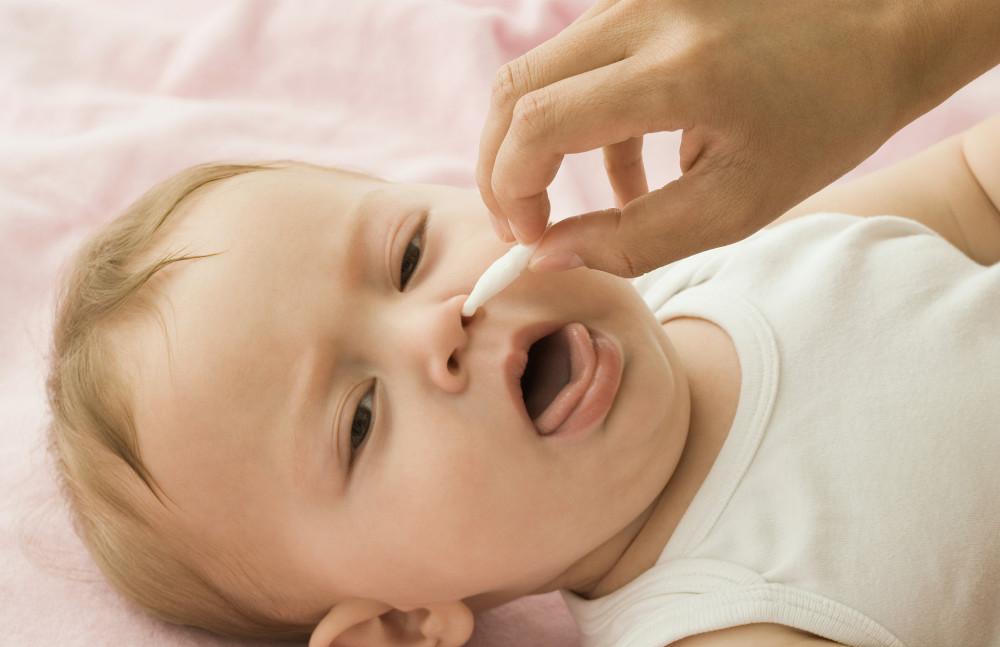1. Nasal congestion
Slight nasal congestion with a hot towel to gently cover the nose, so that the hot air smokes the nasal cavity, if the baby has nasal feces breathing is not smooth, you can drop a drop of cod liver oil into the nasal cavity, after a while the baby will sneeze to sneeze the snout out of the nasal cavity.

2. Spit up milk
For babies who frequently spit up milk, the best position after feeding should be lying on a mattress at an oblique angle of 15-30 degrees (not just raising the head) and lying on the side of the body.
3. Sneeze
The baby sneezes in this case, which is generally delicate in the nasal mucosa and sensitive to external stimuli, so it is normal to sneeze. However, if you have cold symptoms such as sneezing accompanied by a runny nose, you need to seek medical attention.
4. Fever and physical cooling
Baby fever below 38.5 degrees is recommended to take physical cooling, it is not recommended to use alcohol or ice packs to cool down, under the premise of drinking more water, appropriately reduce the cover of clothing, with warm water bath or wipe bath.
5. Colic
First of all, the symptoms of lower intestinal colic: intestinal colic generally refers to the sudden appearance of a small baby crying loudly, sometimes the duration is relatively long, it may also be a burst of attacks, redness of the face, pale lips, abdomen is more swollen, it is a little tight to touch, the legs are rolled upwards, the feet are cold, sometimes the hands are tight, coaxing, feeding can not be relieved, sometimes crying and crying is very exhausted, but after the baby defecates, the symptoms get better. It is generally common for small babies. Small babies have strong contractions due to smooth muscles, causing some flatulence and pain, often at night, mostly infants under 4 months of age.
You can give the baby clockwise lightly rub the stomach, help defecation and exhaust, pay attention to the warmth of the abdomen, and can also take the form of touching to alleviate, must not dry rub, you can use the baby's special touch oil.
6. How to judge how to wear too much
Judge whether the baby is wearing enough to touch the back, there is sweat, indicating that the baby is wearing a little too much, the baby's metabolism is strong, it is recommended to wear as much as adults, or slightly smaller, pay attention not to get cold during illness.
Sleep schedule for 7.0-1 years old at each stage
Babies aged 1-3 months
Normally, babies aged 1-3 months sleep about 16 hours.
During the day, your baby sleeps about 1-2 hours at a time, and needs to sleep about 4 times during the day.
At night, your baby can already sleep for 10-11 hours.
Of course, babies in the early infancy will still wake up suddenly at night, perhaps to breastfeed, may need to change diapers, or may need to be comforted by their mothers.
Babies aged 4-6 months
Infants at 4-6 months of age should be guaranteed to sleep for 14 hours a day.
However, parents should pay attention to the specific sleep time should be adjusted according to the specific situation of the baby, especially do not wake the baby up when the baby sleeps.
Because at this time, the baby will slowly develop a normal work and rest time, and the sleep time during the day will be reduced.
Babies aged 7-12 months
The number of sleeps in the daytime may be gradually reduced in 7-12 months, and the sleep time of the whole day is basically about 14 hours, and the morning and afternoon will sleep 1-2 hours each.
At this time, the baby, basically after sleeping all night, will wake up very early, and there will be several times at night when you need to change the diaper.
8. How big can be held upright
The baby's nervous system development takes precedence over the development of the body and body movements, and can be tried slowly at 2 to 3 months, from less to more.
9. Umbilical hernia
The umbilical bulge is called an umbilical hernia. It increases when crying and defecating; it shrinks when it is quiet. Although the cause is related to the incomplete development of the umbilical abdominal muscles, flatulence (infantile colic) is the main precipitating factor for umbilical hernia.
10. Occasional cough
Babies have occasional coughs, and new parents don't need to be nervous if they have a fever or a continuous cough with poor mental status. Or if the cough is obvious, you need to see a doctor.